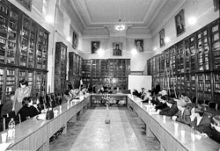On October 15, exactly 385 years ago, a well-off resident of Kyiv, Halshka Hulevychyvna, handed over her land and structures in Podil to the Kyiv Brotherhood so that they could establish a school for “ both rich and poor children.” That day launched the Kiev- Mohyla Academy, one of Europe’s oldest institutions of higher learning. Now the National University of the Kiev-Mohyla Academy (NaUKMA), its vocation can be characterized as great, hard, and long-time work to form the intellect of our nation at all times of its existence. An eloquent account of how this work has been done is given by the KMA Encyclopedia of Names, now in press. This is a study of the destinies of almost all NaUKMA graduates of various times and the observation of those people’s quality of life.
Jaroslaw Rozumnyj, Ph.D. in Philology and Professor at the University of Manitoba, Canada, stresses the tremendous role played in the Kiev-Mohyla Academy’s revival by its president Vyacheslav Briukhovetsky who has proven that one can march forward even in hard economic times if there is the will to do so. Prof. Rozumnyj, pointed out to The Day, “To achieve success, a country should not be isolated but should study and apply the experience of more developed countries. Today, the West is this kind of example. But the example should not be reduced to copying. One must think well and turn over all that can be of use for a given culture. Only this will lead to positive changes. What makes a country strong today is intellect, not geography. Higher education should cooperate with industry, selling ideas and obtaining funds for its existence and development.”
Academy students consider they should find applications for the knowledge they receive. Some of them work in the Verkhovna Rada secretariat, trying to familiarize themselves with problems of state-building. Perhaps the motto, the state is now being built in classrooms makes sense. To create a state, one has to learn to make independent decisions. It is this knowledge that NaUKMA tries to impart. Intellect cannot be formed unless initiative is being developed. “How can initiative be aroused?” is the teachers’ number one research item. They also use here some non- traditional teaching methods and promote the establishment and functioning of students’ organizations, such as the Youth Center of the Humanities, Student Fraternity, the Students’ Research Society, and Plast Students’ Collegium.
“Our research achievements will remain in the shadows unless we show initiative,” Vitaly Padalka, a master’s program student, chairman of the Youth Center. “People should have a chance to read us and change themselves. Independent thinking and initiative should be developed precisely in order to change the state, culture, and attitude toward the Ukrainian state. In this respect, I pin my hopes on the youth center as a non-governmental organization which cooperates with the Academy.” The Youth Center has set up a debate club which invites people interesting to discuss things with. For instance, last week they debated such topics as in search of inheritance and what does it mean to be an heir, while a round-table discussion formally presented the student-prepared CD-ROMs “Reproduction of Spiritual Sources” and “NaUKMA.”
Lesia Aleksiyevets, a lecturer at Ternopil State Pedagogical University, became so interested in the NaUKMA experience that she has made it the subject of her doctoral dissertation and plans to find a rational application of this experience in her own teaching work.
Meanwhile, higher educational institutions all over Ukraine are already using the NaUKMA experience during last summer’s entrance exams, in particular the submission of the copies, not originals, of high school diplomas to enable prospective students to try their luck, applying to several colleges or universities (the Kiev-Mohyla Academy has been working with certified copies since 1992). What is now under discussion is using the NaUKMA experience of holding admission tests rather than exams. An association of the academy’s collegiums has been formed. It includes comprehensive secondary schools that function under the national curriculum, but under the NaUKMA patronage. There are eleven schools of this kind, situated in various cities of Ukraine. There is also a collegium in the village of Rozhniv in Ivano- Frankivsk oblast, and another is being opened in Rohatyn, also in that same oblast.







